Tackling Respiratory Issues in Senior Bulldogs: Managing Your Pet's Health
Bulldogs are brachycephalic dogs that are prone to increased respiratory distress when they become much older. Apart from being highly at risk of breathing problems, severely affected dogs in their senior years are also susceptible to upper airway abnormalities that can lead to very serious consequences if not dealt with the right way.
We've put together this comprehensive blog post to not just walk you through the crucial things you need to know about properly dealing with a respiratory crisis in brachycephalic dog breeds, but also give you a rundown of the indicators that your pet could be vulnerable to the same.
Whether you have a French bulldog or perhaps the English or American variety, make sure you follow along to get in on some useful and practical tips that your pet will surely appreciate. How about we start things off by having a quick overview of respiratory distress in aging bulldogs?
Understanding Respiratory Distress in Senior Bulldogs
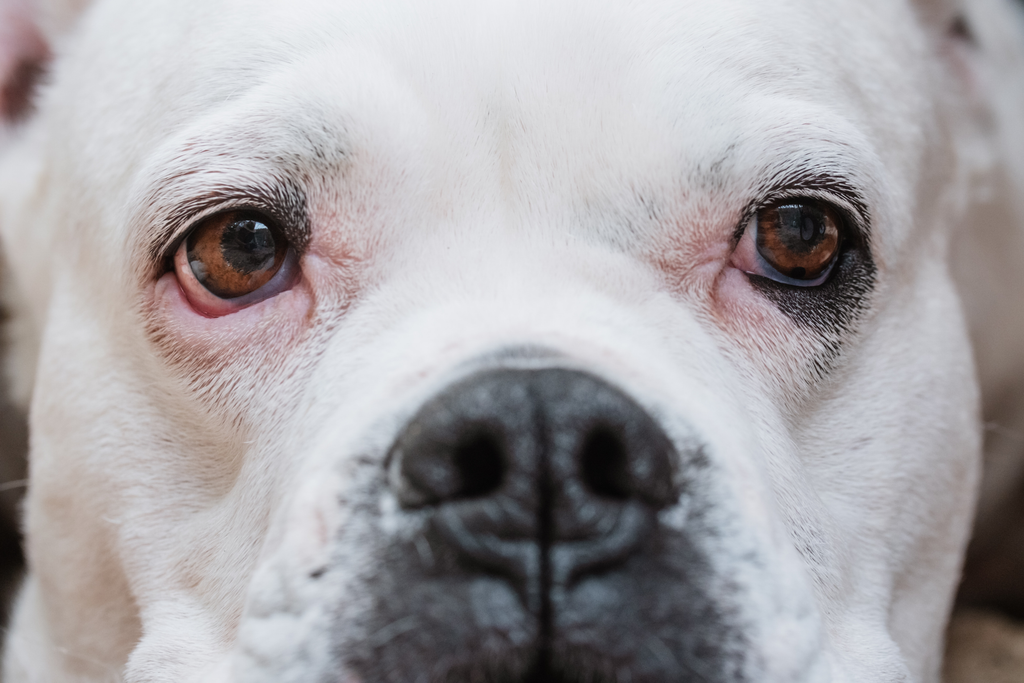
The term "respiratory distress" is a catch-all phrase that covers several respiratory health issues among French bulldogs, as well as their American and English cousins. These may include labored breathing, upper airway obstruction, chronic inflammation of nasal passages, elevated laryngeal saccules, laryngeal paralysis as well and brachycephalic obstructive airway syndrome—BOAS, just to name a few.
However, we'd just like to emphasize that healthy dogs can experience breathing issues from time to time. It does not automatically follow that your pet is already having respiratory distress just because he's panting heavily, sneezing in a more forceful manner, or breathing in a much noisier way. Normal dogs do these quite a lot, too.
On the other hand, it is a different story if these breathing problems and respiratory tract issues become increasingly frequent and severe in nature. Knowing how to address these conditions is crucial to ward off possible serious respiratory crises.
Please take note that severe cases of respiratory difficulties can even potentially lead to fatal consequences in some affected dogs, particularly in cases where conditions like aspiration pneumonia, laryngeal collapse, and pulmonary edema are already involved.
Senior Bulldogs and Their Brachycephalic Airway
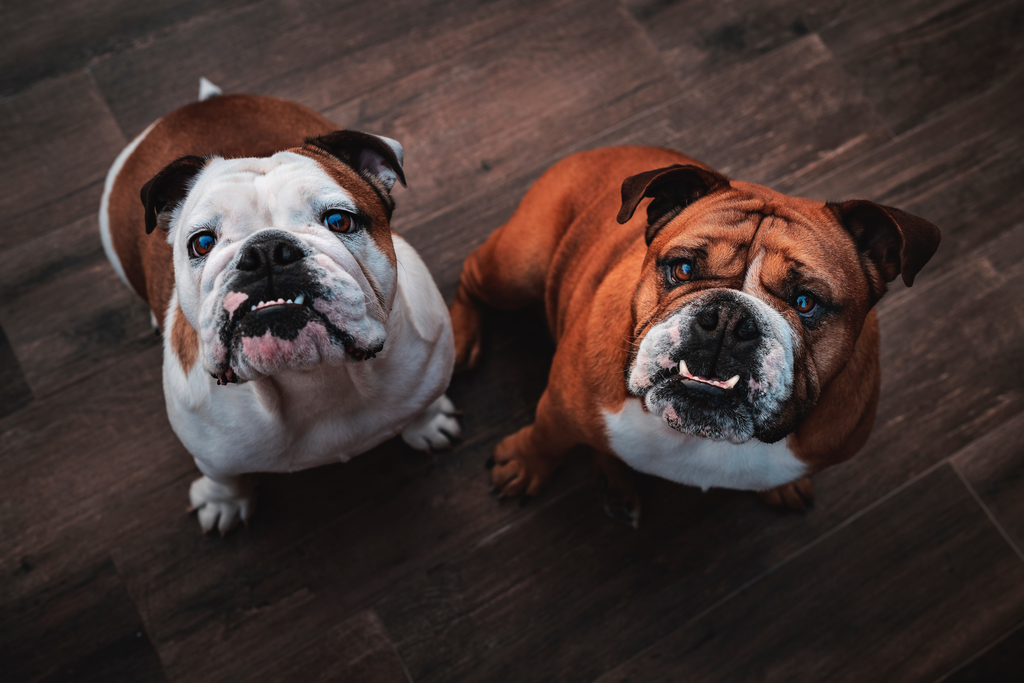
The biggest reason why older American, English, and French bulldogs, among others, are highly prone to upper respiratory airway disease and illness is because of their brachycephalic skull structure. It is characterized by a round head with a short, pushed-in muzzle.
Aside from French bulldogs and their American and English cousins, other brachycephalic breeds include Boston Terriers, English Toy Spaniels, Boxers, Lhasa Apsos, Bullmastiffs, Pugs, Shih Tzus and Chow Chows.
Brachycephalic dogs often have narrow nostrils, an elongated soft palate as well and soft tissue structures in their respiratory system that are much more brittle compared to their non-brachycephalic counterparts. They are also at risk of brachycephalic obstructive airway syndrome and aspiration pneumonia due to this distinct physical attribute.
Apart from breathing problems, dogs affected are also more prone to nasal obstruction and sleep-disordered breathing. Respiratory noise is much more pronounced among brachycephalic breeds as well, especially among dogs with an abnormally increased airway resistance. Severely affected individuals may even be prone to hiatal hernia sooner or later, too.
Remember that overlooking or ignoring these issues will just result in more health problems. This is why it's extremely important to have the know-how to properly manage and support respiratory issues in aging bulldogs.
Now we've got that covered, let's check out the common factors that can set off respiratory compromise among senior bulldogs and other brachycephalic breeds.
Causes of Obstructive Airway Syndrome BOAS and Similar Respiratory Problems in Aging Bulldogs
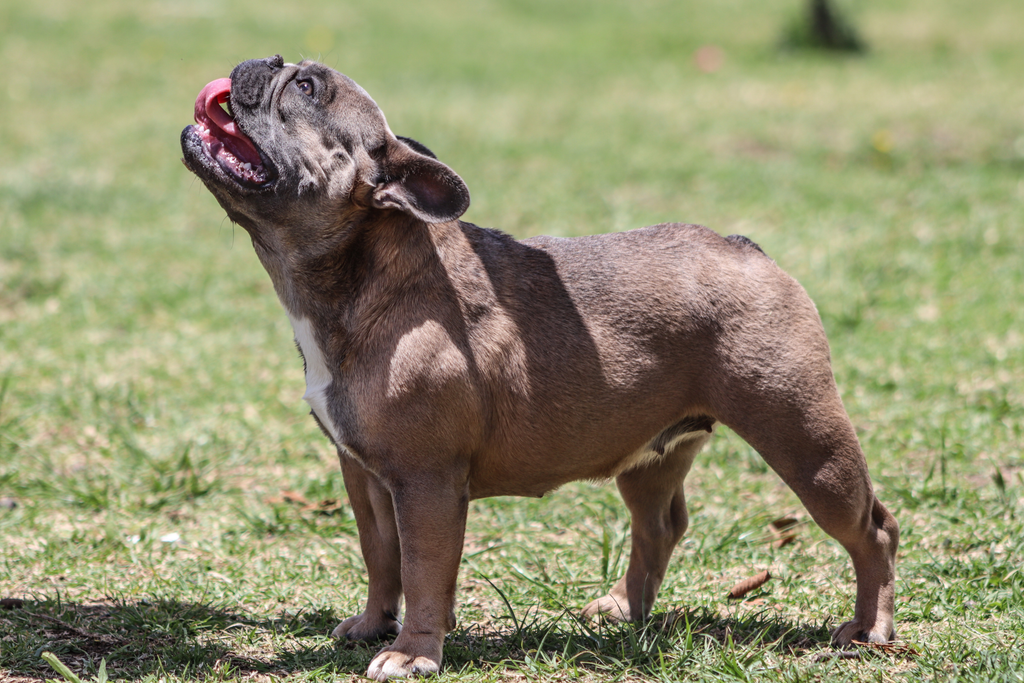
Respiratory system issues with respect to aging English, American and French bulldogs are usually set off by key factors. Some of these factors are hereditary in nature, while a few of them may be inadvertently triggered by pet parents such as yourself. The following are the factors you should keep in mind:
Physiological and degenerative changes
Brachycephalic dogs like French bulldogs normally go through a lot of changes as they get older. Some of these notable changes include a slower metabolism rate, a longer healing time for cells and tissues, joints and bones becoming more fragile, and a weaker overall immune system health, just to name a few.
With their bodies' first line of defense not working as efficiently as they used to, affected dogs in their golden years often become highly prone to brachycephalic airway obstructive syndrome and other types of respiratory problems. Aspiration pneumonia can also possibly take place in this situation.
Moreover, congenital respiratory tract defects in brachycephalic dogs also tend to surface during their golden years. These make them more vulnerable to airway disease and increased respiratory tract illnesses in the process.
Issues resulting from their brachycephalic skulls
As we emphasized earlier, a brachycephalic dog will normally have a round head with a short, pushed-in muzzle. This makes him more susceptible to three (3) common issues that can disrupt ideal respiratory function, particularly stenotic nares, an elongated soft palate, and hypoplastic trachea. We will discuss each of these more in detail below:
Stenotic nares are simply the technical term for "narrow nostrils." This does not just describe the physical appearance of a dog's nose, but it must be so narrow that it already causes breathing difficulties and airway obstruction for the term to be applicable.
Given the physiological changes that are taking place, a senior French bulldog may have nostrils so narrow that it will already cause brachycephalic airway syndrome or upper respiratory syndrome at some point. This condition can be remedied by corrective surgery performed by a veterinary medicine professional.
Elongated soft palate pertains to the condition when brachycephalic dogs have an overlong soft palate and it already disrupts how air circulates in the respiratory system. It can cause breathing problems so bad that soft palate surgery—such as soft palate resection or some other type of surgical intervention—will already be required.
Hypoplastic trachea refers to the situation when brachycephalic dogs like French bulldogs have a windpipe or trachea that is smaller in diameter than usual and can lead to respiratory compromise sooner or later.
Apart from causing breathing problems, a dog may also be vulnerable to laryngeal collapse, which results in labored breathing that is accompanied by odd noises. However, compared to stenotic nares and an elongated soft palate, a hypoplastic trachea cannot be fixed through surgical correction.
Oral and dental disease
While this may sound surprising, the risk that a brachycephalic dog may be vulnerable to airway disease and upper airway obstruction becomes higher when he is suffering from oral and dental problems. This is especially true among American, English, and French bulldogs that are predisposed to brachycephalic obstructive airway syndrome.
Bad bacteria from gum disease and tooth decay can get into the oral and nasal passages causing swelling and inflammation. This can result in increased airway resistance and eventually breathing problems if not properly dealt with.
Moreover, these bacteria can also infiltrate the blood vessels and potentially cause damage to the organs in some cases. The presence of these unwanted visitors can even lead to heart and kidney failure if neglected.
Heightened sensitivity to heat
One of the biggest negative effects of airway disease and upper airway obstruction in brachycephalic dogs is a significant decrease in the ability to regulate body temperature. This makes them an easy target for temperature-related conditions like hyperthermia and heat stroke.
Since brachycephalic breeds like French bulldogs primarily get rid of excessive heat through panting, not to mention letting it out through their nose and paw pads, body temperature regulation can become very tricky in this situation.
Excessive weight gain
Although upper airway obstruction and similar respiratory problems in brachycephalic dogs usually have to do with their distinctly shaped skulls, putting on too much weight can also instigate the same. See, when French bulldogs and other brachycephalic breeds are suffering from obesity, the extra pounds can cause their respiratory systems to strain more than they're capable of.
The presence of stenotic nares, an elongated soft palate, and hypoplastic trachea can also aggravate the situation. Besides breathing problems, your senior bulldog can also be possibly at risk of laryngeal collapse or laryngeal paralysis when this happens.
Unforeseen infections
Infections caused by bacteria, viruses, and fungi are also possible instigators of breathing problems set off by upper airway obstruction, aspiration pneumonia, and other clinical signs of respiratory distress. Some common examples include infections from gum disease and those triggered by gastrointestinal tract lesions.
Although disease severity plays a role in this situation, the risk can be higher for brachycephalic breeds like French bulldogs since they can also have everted laryngeal saccules, stenotic nares, an elongated soft palate as well as a hypoplastic trachea.
Clinical Signs of Airway Disease and Severe Respiratory Distress in Senior Bulldogs

Brachycephalic obstructive airway syndrome and similar respiratory problems like laryngeal paralysis and aspiration pneumonia in aging bulldogs have key indicators that you should take note of. While breathing problems are the most common symptoms that you may observe when it comes to these issues, there are others that you may not still be aware of.
Your senior dog may be suffering from these respiratory problems if he is exhibiting the following symptoms. It is crucial to keep in mind that the help of a vet or a pet wellness professional is urgently needed should these persist.
Your dog's breathing will become faster and noisier.
As we emphasized earlier, breathing problems are the most common clinical signs of respiratory conditions like airway obstruction and everted laryngeal saccules. This is typically characterized by your dog's breathing picking up in pace to take in more air to his lungs.
Besides his breathing taking on a faster rhythm, this is also accompanied by respiratory signs of distress like slurping sounds or prolonged deep sighs. These may already be indicators of a hiatal hernia or aspiration pneumonia and may require a lateral thoracic radiograph to properly determine the problem.
His lips, tongue, and gums will have a bluish appearance.
One common yet overlooked sign of brachycephalic airway syndrome and other problems affecting the upper airway in aging bulldogs is the lips, tongue, and gums suddenly taking on a bluish tinge. Technically referred to as cyanosis, this signifies that there is not a sufficient amount of oxygen circulating in his body.
What's alarming is that this condition is rather common in dogs having a brachycephalic airway structure and will often manifest when they are advanced in age due to their extended soft palate as well as the possible presence of everted laryngeal saccules. Surgical correction is already required in very severe cases.
Your pet will drool and snore more than usual.
Some clinical signs of brachycephalic syndrome among much older American, English, and French Bulldogs may not seem to be that harmful. These include drooling and excessive snoring, which may look rather benign and even cute to some.
Although these dogs are predisposed to drool a lot because of their distinctly shaped skulls that are prone to laryngeal paralysis, constant bouts of excessive drooling can already mean breathing problems and airway obstruction.
On the other hand, excessive snoring is one of the clinical signs of hiatal hernia and an extended soft palate. This may even be an indicator of a possible airway collapse in some dogs, particularly those that are extremely prone to upper respiratory syndrome.
He will display frequent bouts of exercise intolerance.
Although senior dogs are not that active compared to their much younger counterparts, exercise intolerance can also mean that your pooch may be suffering from respiratory problems. This health issue is often aggravated by the "brachycephalic airway" that all bulldogs are vulnerable to.
Normal dogs can typically be engaged in vigorous physical or mental activities for at least fifteen (15) or twenty (20) minutes before requiring a break. However, those susceptible to brachycephalic syndrome will already show signs of fatigue in about half the time, especially during their senior years due to breathing problems.
Your dog may exhibit signs of extreme stress and anxiety.
Respiratory issues like having an overextended soft palate and being prone to airway obstruction are not just something that affect your aging dog in a physical way. They can also have a negative impact on his mental health, especially when these breathing problems take place almost constantly.
Besides making your aging pooch feel extremely stressed, he may also be prone to developing anxiety in the process. Additionally, if your pet has a chronic upper airway problem or perhaps has an issue with aspiration pneumonia, he will most likely show signs of having panic attacks at the most unexpected of times.
He will choke or gag when drinking or eating.
If you observe that your aging bulldog is frequently gagging or choking when he's eating or drinking, it is possible that he may be suffering from an upper airway problem, such as an elongated soft palate. Apart from setting off breathing problems, this condition can also prevent him from swallowing food or water properly.
Some dogs may even require invasive procedures like soft palate resection, a type of surgical correction, to improve overall breathing and respiratory function. Additionally, irregularities in the facial structure of brachycephalic dogs are often attributed to the development of a hiatal hernia as well as laryngeal collapse, among other conditions.
The Risks of Not Properly Dealing With Brachycephalic Obstructive Airway Syndrome

Breathing problems are definitely not something you should just shrug off when it comes to aging bulldogs. Sure, they may be quite common among brachycephalic breeds, but deliberately ignoring them can lead to a lot of serious health issues sooner or later.
What's really alarming is that these conditions may even have sudden fatal consequences in some dogs if not immediately taken care of. Below are the risks that you may be inadvertently subjecting your senior pooch to when respiratory issues are concerned:
Drastic decline in overall quality of life
If you're anything like most people, chances are you've already experienced having a clogged nose. Isn't it something that is really annoying? In the case of breathing problems caused by brachycephalic syndrome, your aging dog could be experiencing the same issue almost always.
Besides preventing him from participating in activities like walking, playing fetch, tug of war and similar games, breathing problems will also keep him from enjoying life to the fullest. Your dog is definitely going to miss out on a lot when this happens.
Costly financial consequences
Respiratory conditions like upper airway abnormalities and aspiration pneumonia can mean spending a lot of money in the long run if not properly corrected and supported as soon as possible. These health problems often become increasingly severe during your dog's golden years and will even require invasive procedures to fix.
Underlying health issues will become aggravated
It's not uncommon that senior bulldogs are also susceptible to underlying health issues like diabetes, heart disease, and high blood pressure. Since your pet's body requires a sufficient supply of oxygen to stay in tiptop shape, breathing problems can potentially make these conditions worse.
Inadequate physical and mental stimulation
Breathing problems can drastically reduce your aging pet's interest and participation in games and activities that he usually enjoys. Apart from making your pooch prone to obesity, the lack of physical and mental stimulation can also set off the onset of anxiety in dogs, which is often connected to bad behaviors such as sudden aggression and destructive exploits.
Increased vulnerability to infections
Oxygen plays a key role in maintaining an ideal overall immune system health. It is also crucial in healing and rejuvenating cells and tissues. Without a sufficient supply of oxygen, your much older bulldog's body will have a poor first line of defense against bacteria and other unwanted visitors that can trigger infections and similar illnesses.
Significantly reduced lifespan
Breathing problems have an indirect effect on an aging bulldog's lifespan. As we've highlighted earlier, it can contribute to the development of obesity, heart disease, poor immune system health as well as susceptibility to infections. This just goes to show that respiratory issues in senior bulldogs are not something that you should just pass over.
Managing Respiratory Issues in Senior Bulldogs the Right Way
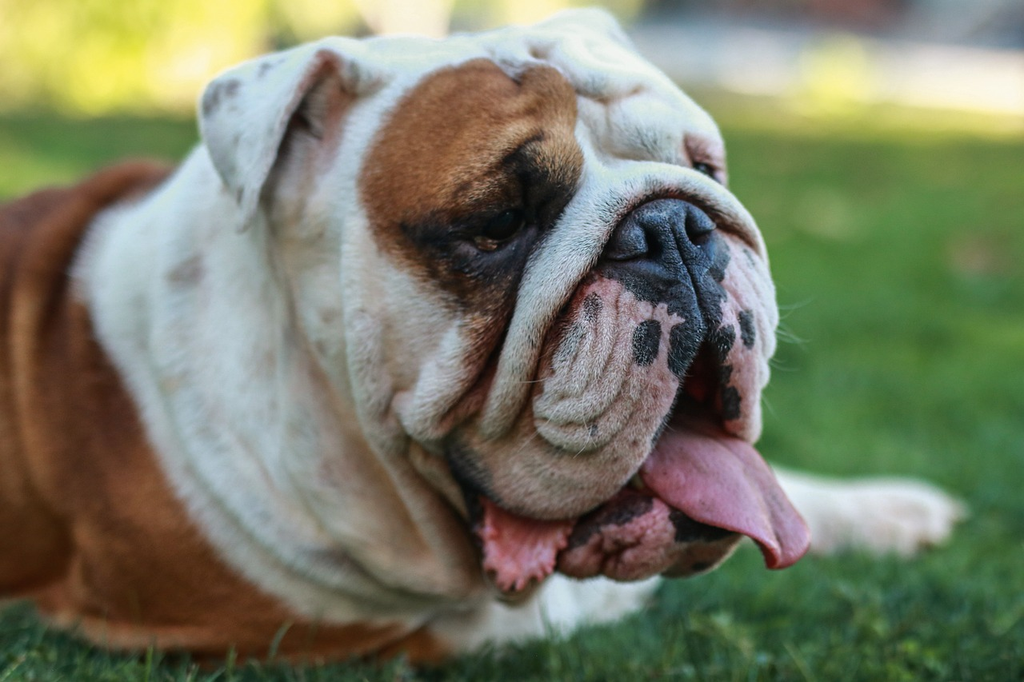
Unlike what a lot of pet parents mistakenly think, managing respiratory problems in senior bulldogs is not that complicated at all. For this part of our discussion, we will go over some simple and practical tips that won't just help you manage these issues, but also keep your much older pooch as happy and healthy as can be.
Schedule regular checkups with a professional.
Early detection is crucial when it comes to respiratory distress. Make it a point to visit your vet or consult a pet homeopathy expert on a regular basis to zero in on possible problems that can eventually result to more serious issues before you know it. Respiratory problems often require technical know-how to be diagnosed properly.
Put together a viable low-impact exercise routine for your aging pooch.
The presence of respiratory issues does not mean that you should totally do away with your aging dog's workout schedule. It is highly recommended that you switch to low-impact exercise routines like brisk walks, swimming, playing fetch and setting up an indoor agility course. Teaching your pooch new commands and tricks is also a great way to keep him mentally stimulated in the process.
Protect your aging bulldog from possible respiratory distress triggers.
While this may sound surprising, the most common respiratory distress triggers can be found in your senior Bulldog's immediate environment. This can include exposure to cigarette smoke, harsh household chemicals like bleach and oven cleaners, as well as car exhaust. Allergens like mold spores and pollen should also be avoided, if possible.
Keep his food intake appropriate for his age and size.
Maintaining an ideal diet regimen for your senior dog can do wonders for his overall respiratory system. Besides keeping his weight in check, which can put a lot of stress on his breathing, it can also help in preventing gastrointestinal issues such as short-term acid reflux that can potentially set off sleep apnea and excessive snoring.
Factor in the weather when engaging your pet in physical or mental activity.
Senior dogs with respiratory distress can have a tricky time regulating their body temperature. Always make sure you consider the weather when engaging him in physical and mental activities outdoors. Moreover, we highly recommend bringing along lots of water while you're at it so he won't be prone to health problems like hyperthermia and heat stroke in the process.




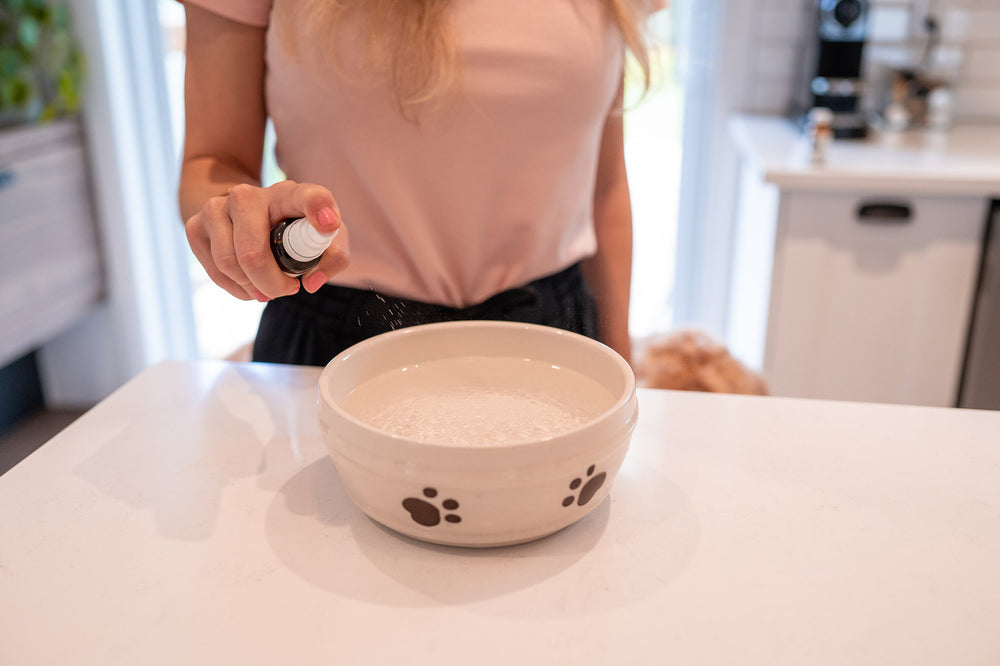


Leave a comment